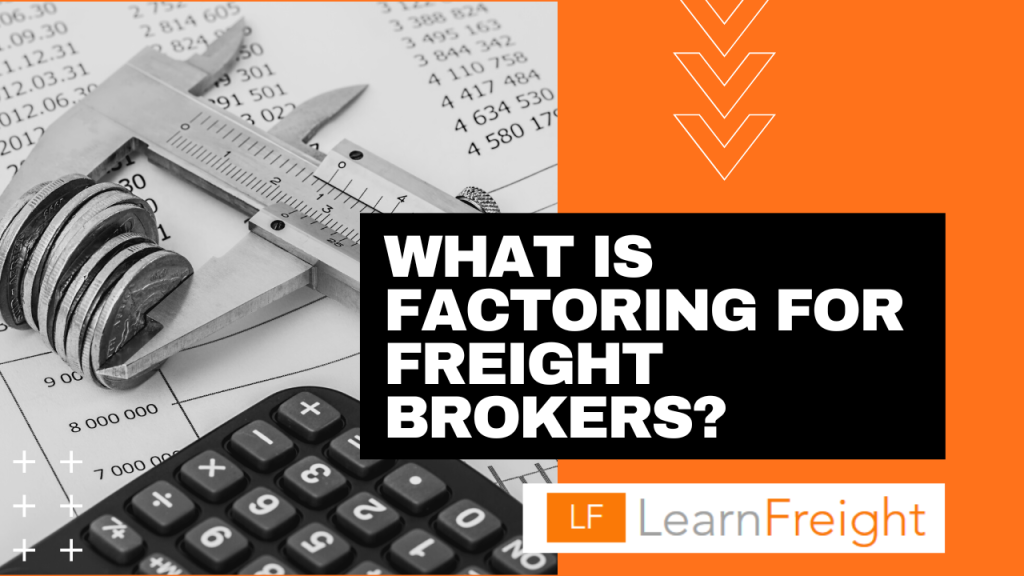Now, they will not pay you the entire thousand dollars. They will pay you a discounted amount, which may be, let’s say, $950. So, you can receive $950 today, and the factoring company will collect the entire $1,000 from the shipper 90 days later.
Do freight brokers use factoring companies? Yes, absolutely, Freight Brokers use factoring companies.
Should you be using one? As discussed in our freight broker training course, that depends on the size of your operation. If you don’t do too much business or have sufficient operational capital, you don’t need a factoring company. However, if you are doing a lot of business and don’t have enough capital, you may run into a problem known as a “cash flow gap”. Basically, that’s when you are owed a certain amount of money but you won’t get it until 60 to 90 days from now, and you have to pay transportation companies within 30 days. So, you have to use your own capital to pay transportation companies. But you will not actually collect your fees until later. And this is where a factoring company can help you solve this problem.
As soon as loads get delivered by a transportation company, you can sell the invoices to a factoring company and get paid immediately. This will allow you to pay motor carriers faster, and you receive your commissions faster as well.

How should factoring companies be selected? Let’s look at four of the most important factors you need to look for before you sign up with a factoring company.
1. Rate – That’s the factor that everyone is looking for. They want to know how much a factoring company will charge them for factoring the loads, and everyone tries to get the lowest rate possible. Now that is great if you get the low rate because the more money you save, the more money will end up in your pocket. However, it’s not the only factor you need to consider.
2. Reserve – Factoring companies require you to keep some of your funds in reserve just in case something goes wrong, and they don’t get paid for the transaction they’ve funded. They want to build up a certain amount in reserve, so they can tap into that capital if needed. For example, a low rate of, say, 2% with a 10% reserve is already not so attractive because you will only receive 88% of your money since 10% will be tied up somewhere in reserves. Yes, you will eventually receive it, but it’s money that you cannot access right away. So again, your goal is not just to get the lowers possible rate but also the lowest possible reserve requirements. Or, if possible, try to find a factoring company that doesn’t have a reserve requirement. That’s ideal because then you just pay a percentage for factoring, and you keep the rest of the money.
3. Recourse and Non-Recourse – Again, in simple words, recourse means that if the factoring company doesn’t get paid by the shipper for whatever reason, they will come to you and say, “Sorry Mr. Broker, we did not get the money from the shipper, so you have to pay us back.” This is not very good for you as a freight broker. But there are factoring companies that do offer a non-recourse option. That means that even if they don’t collect money from the shipper, it is no longer your problem. That is now factoring company’s problem. In most cases factoring companies will charge you a higher rate for Non-recourse factoring. Recourse factoring will always have a lower rate than non-recourse factoring because non-recourse carries a higher risk. We personally would choose non-recourse even with the higher rate, but that’s our preference because we want the factoring company to carry all the financial risks.
4. Terms – When we say Terms, we’re talking about the terms of your agreement with the factoring company. Some of the companies want to lock you into a long-term contract. And if you want to cancel sooner, they will charge you very, very high fees, which is not a good scenario. You want to have flexibility and be able to switch factoring companies if needed. So, read through the contract, pay special attention to the termination terms. Will you be able to cancel the contract? If so, what is it going to cost you?
We hope that now you have learned a few things about factoring, why freight brokers are using it, and what you need to look out for when selecting a factoring company for your freight brokerage.
Are you thinking about becoming a Freight Broker or a Freight Agent? LearnFreight offers Online Freight Brokering Training Courses which are suitable for people not familiar with transportation industry. Learn more about our training by visiting Training Details page or choose your course here.
